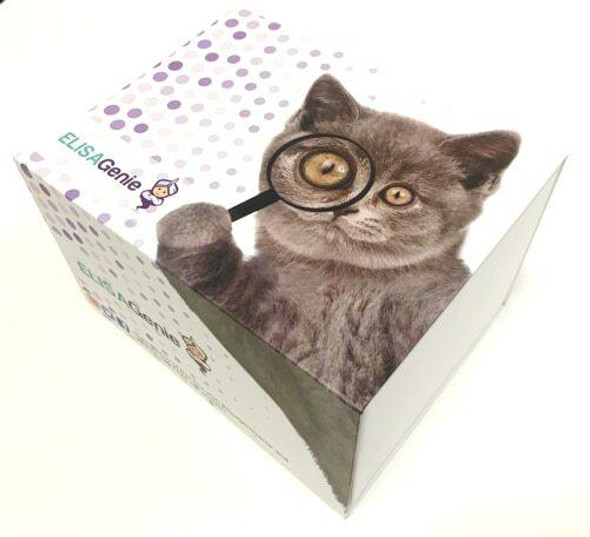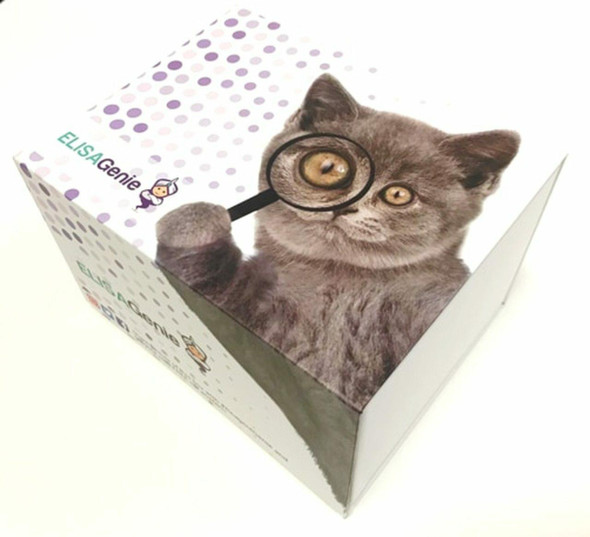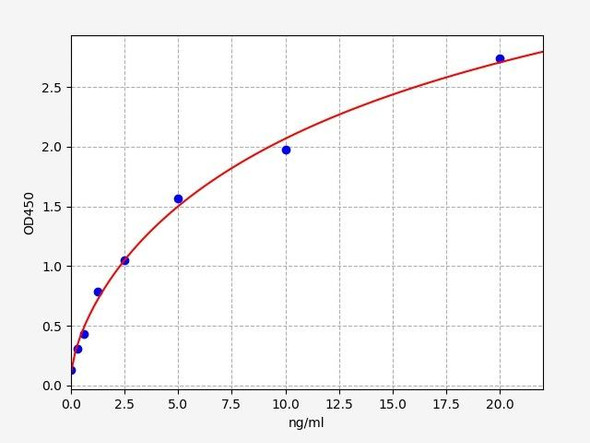Human Prokineticin 2 ELISA Kit
- SKU:
- HUFI02743
- Product Type:
- ELISA Kit
- Size:
- 96 Assays
- Uniprot:
- Q9HC23
- Sensitivity:
- 0.188ng/ml
- Range:
- 0.313-20ng/ml
- ELISA Type:
- Sandwich
- Synonyms:
- PK2, Prokineticin-2, PROK2, BV8, Protein Bv8 homolog
- Reactivity:
- Human
- Research Area:
- Cell Biology
Description
Human Prokineticin 2 ELISA Kit
The Human Prokineticin-2 ELISA Kit is specifically designed for the precise and reliable measurement of Prokineticin-2 levels in human serum, plasma, and cell culture supernatants. This kit offers exceptional sensitivity and specificity, ensuring consistent and accurate results for a variety of research applications.Prokineticin-2 is a key protein involved in various biological processes, including circadian rhythm regulation, pain perception, and vascular development. Dysregulation of Prokineticin-2 has been linked to a range of diseases and disorders, such as migraines, inflammatory conditions, and cancer, making it a valuable biomarker for understanding these conditions and exploring potential therapeutic strategies.
With its advanced technology and user-friendly format, the Human Prokineticin-2 ELISA Kit is an indispensable tool for researchers seeking to investigate the role of Prokineticin-2 in health and disease. Unlock new insights and enhance your research with this innovative assay kit.
| Product Name: | Human Prokineticin 2 ELISA Kit |
| Product Code: | HUFI02743 |
| Size: | 96 Assays |
| Alias: | PK2, Prokineticin-2, PROK2, BV8, Protein Bv8 homolog |
| Detection method: | Sandwich ELISA, Double Antibody |
| Application: | This immunoassay kit allows for the in vitro quantitative determination of Human PK222 concentrations in serum plasma and other biological fluids. |
| Sensitivity: | 0.188ng/ml |
| Range: | 0.313-20ng/ml |
| Storage: | 4°C for 6 months |
| Note: | For Research Use Only |
| Recovery: | Matrices listed below were spiked with certain level of Human PK222 and the recovery rates were calculated by comparing the measured value to the expected amount of Human PK222 in samples. | ||||||||||||||||
| |||||||||||||||||
| Linearity: | The linearity of the kit was assayed by testing samples spiked with appropriate concentration of Human PK222 and their serial dilutions. The results were demonstrated by the percentage of calculated concentration to the expected. | ||||||||||||||||
| |||||||||||||||||
| CV(%): | Intra-Assay: CV<8% Inter-Assay: CV<10% |
| Component | Quantity | Storage |
| ELISA Microplate (Dismountable) | 8×12 strips | 4°C for 6 months |
| Lyophilized Standard | 2 | 4°C/-20°C |
| Sample/Standard Dilution Buffer | 20ml | 4°C |
| Biotin-labeled Antibody(Concentrated) | 120ul | 4°C (Protect from light) |
| Antibody Dilution Buffer | 10ml | 4°C |
| HRP-Streptavidin Conjugate(SABC) | 120ul | 4°C (Protect from light) |
| SABC Dilution Buffer | 10ml | 4°C |
| TMB Substrate | 10ml | 4°C (Protect from light) |
| Stop Solution | 10ml | 4°C |
| Wash Buffer(25X) | 30ml | 4°C |
| Plate Sealer | 5 | - |
Other materials and equipment required:
- Microplate reader with 450 nm wavelength filter
- Multichannel Pipette, Pipette, microcentrifuge tubes and disposable pipette tips
- Incubator
- Deionized or distilled water
- Absorbent paper
- Buffer resevoir
| Uniprot | Q9HC23 |
| UniProt Protein Function: | PROK2: May function as an output molecule from the suprachiasmatic nucleus (SCN) that transmits behavioral circadian rhythm. May also function locally within the SCN to synchronize output. Potently contracts gastrointestinal (GI) smooth muscle. Defects in PROK2 are the cause of Kallmann syndrome type 4 (KAL4); also known as hypogonadotropic hypogonadism and anosmia. Anosmia or hyposmia is related to the absence or hypoplasia of the olfactory bulbs and tracts. Hypogonadism is due to deficiency in gonadotropin-releasing hormone and probably results from a failure of embryonic migration of gonadotropin- releasing hormone-synthesizing neurons. KAL4 patients have variable degrees of olfactory and reproductive dysfunction, but do not show any of the occasional clinical anomalies reported in Kallmann syndrome such as renal agenesis, cleft lip/palate, selective tooth agenesis, and bimanual synkinesis. Belongs to the AVIT (prokineticin) family. 2 isoforms of the human protein are produced by alternative splicing. |
| UniProt Protein Details: | Protein type:Secreted; Secreted, signal peptide Chromosomal Location of Human Ortholog: 3p13 Cellular Component: extracellular region Molecular Function:G-protein-coupled receptor binding Biological Process: circadian rhythm; activation of MAPK activity; sensory perception of pain; chemotaxis; cell proliferation; G-protein coupled receptor protein signaling pathway; elevation of cytosolic calcium ion concentration; neuropeptide signaling pathway; spermatogenesis; angiogenesis; positive regulation of smooth muscle contraction; inflammatory response; negative regulation of apoptosis Disease: Hypogonadotropic Hypogonadism 4 With Or Without Anosmia |
| NCBI Summary: | This gene encodes a protein expressed in the suprachiasmatic nucleus (SCN) circadian clock that may function as the output component of the circadian clock. The secreted form of the encoded protein may also serve as a chemoattractant for neuronal precursor cells in the olfactory bulb. Proteins from other vertebrates which are similar to this gene product were isolated based on homology to snake venom and secretions from frog skin, and have been shown to have diverse functions. Mutations in this gene are associated with Kallmann syndrome 4. Multiple transcript variants encoding different isoforms have been found for this gene. [provided by RefSeq, Jul 2008] |
| UniProt Code: | Q9HC23 |
| NCBI GenInfo Identifier: | 18202953 |
| NCBI Gene ID: | 60675 |
| NCBI Accession: | Q9HC23.2 |
| UniProt Secondary Accession: | Q9HC23,Q53Z79, Q6ISR0, |
| UniProt Related Accession: | Q9HC23 |
| Molecular Weight: | Calculated MW: 11kDa/14kDaObserved MW: 17kDa |
| NCBI Full Name: | Prokineticin-2 |
| NCBI Synonym Full Names: | prokineticin 2 |
| NCBI Official Symbol: | PROK2 |
| NCBI Official Synonym Symbols: | BV8; HH4; PK2; KAL4; MIT1 |
| NCBI Protein Information: | prokineticin-2; protein Bv8 homolog |
| UniProt Protein Name: | Prokineticin-2 |
| UniProt Synonym Protein Names: | Protein Bv8 homolog |
| Protein Family: | Prokineticin |
| UniProt Gene Name: | PROK2 |
| UniProt Entry Name: | PROK2_HUMAN |
*Note: Protocols are specific to each batch/lot. For the correct instructions please follow the protocol included in your kit.
Before adding to wells, equilibrate the SABC working solution and TMB substrate for at least 30 min at 37°C. When diluting samples and reagents, they must be mixed completely and evenly. It is recommended to plot a standard curve for each test.
| Step | Protocol |
| 1. | Set standard, test sample and control (zero) wells on the pre-coated plate respectively, and then, record their positions. It is recommended to measure each standard and sample in duplicate. Wash plate 2 times before adding standard, sample and control (zero) wells! |
| 2. | Aliquot 0.1ml standard solutions into the standard wells. |
| 3. | Add 0.1 ml of Sample / Standard dilution buffer into the control (zero) well. |
| 4. | Add 0.1 ml of properly diluted sample ( Human serum, plasma, tissue homogenates and other biological fluids.) into test sample wells. |
| 5. | Seal the plate with a cover and incubate at 37 °C for 90 min. |
| 6. | Remove the cover and discard the plate content, clap the plate on the absorbent filter papers or other absorbent material. Do NOT let the wells completely dry at any time. Wash plate X2. |
| 7. | Add 0.1 ml of Biotin- detection antibody working solution into the above wells (standard, test sample & zero wells). Add the solution at the bottom of each well without touching the side wall. |
| 8. | Seal the plate with a cover and incubate at 37°C for 60 min. |
| 9. | Remove the cover, and wash plate 3 times with Wash buffer. Let wash buffer rest in wells for 1 min between each wash. |
| 10. | Add 0.1 ml of SABC working solution into each well, cover the plate and incubate at 37°C for 30 min. |
| 11. | Remove the cover and wash plate 5 times with Wash buffer, and each time let the wash buffer stay in the wells for 1-2 min. |
| 12. | Add 90 µl of TMB substrate into each well, cover the plate and incubate at 37°C in dark within 10-20 min. (Note: This incubation time is for reference use only, the optimal time should be determined by end user.) And the shades of blue can be seen in the first 3-4 wells (with most concentrated standard solutions), the other wells show no obvious color. |
| 13. | Add 50 µl of Stop solution into each well and mix thoroughly. The color changes into yellow immediately. |
| 14. | Read the O.D. absorbance at 450 nm in a microplate reader immediately after adding the stop solution. |
When carrying out an ELISA assay it is important to prepare your samples in order to achieve the best possible results. Below we have a list of procedures for the preparation of samples for different sample types.
| Sample Type | Protocol |
| Serum | If using serum separator tubes, allow samples to clot for 30 minutes at room temperature. Centrifuge for 10 minutes at 1,000x g. Collect the serum fraction and assay promptly or aliquot and store the samples at -80°C. Avoid multiple freeze-thaw cycles. If serum separator tubes are not being used, allow samples to clot overnight at 2-8°C. Centrifuge for 10 minutes at 1,000x g. Remove serum and assay promptly or aliquot and store the samples at -80°C. Avoid multiple freeze-thaw cycles. |
| Plasma | Collect plasma using EDTA or heparin as an anticoagulant. Centrifuge samples at 4°C for 15 mins at 1000 × g within 30 mins of collection. Collect the plasma fraction and assay promptly or aliquot and store the samples at -80°C. Avoid multiple freeze-thaw cycles. Note: Over haemolysed samples are not suitable for use with this kit. |
| Urine & Cerebrospinal Fluid | Collect the urine (mid-stream) in a sterile container, centrifuge for 20 mins at 2000-3000 rpm. Remove supernatant and assay immediately. If any precipitation is detected, repeat the centrifugation step. A similar protocol can be used for cerebrospinal fluid. |
| Cell culture supernatant | Collect the cell culture media by pipette, followed by centrifugation at 4°C for 20 mins at 1500 rpm. Collect the clear supernatant and assay immediately. |
| Cell lysates | Solubilize cells in lysis buffer and allow to sit on ice for 30 minutes. Centrifuge tubes at 14,000 x g for 5 minutes to remove insoluble material. Aliquot the supernatant into a new tube and discard the remaining whole cell extract. Quantify total protein concentration using a total protein assay. Assay immediately or aliquot and store at ≤ -20 °C. |
| Tissue homogenates | The preparation of tissue homogenates will vary depending upon tissue type. Rinse tissue with 1X PBS to remove excess blood & homogenize in 20ml of 1X PBS (including protease inhibitors) and store overnight at ≤ -20°C. Two freeze-thaw cycles are required to break the cell membranes. To further disrupt the cell membranes you can sonicate the samples. Centrifuge homogenates for 5 mins at 5000xg. Remove the supernatant and assay immediately or aliquot and store at -20°C or -80°C. |
| Tissue lysates | Rinse tissue with PBS, cut into 1-2 mm pieces, and homogenize with a tissue homogenizer in PBS. Add an equal volume of RIPA buffer containing protease inhibitors and lyse tissues at room temperature for 30 minutes with gentle agitation. Centrifuge to remove debris. Quantify total protein concentration using a total protein assay. Assay immediately or aliquot and store at ≤ -20 °C. |
| Breast Milk | Collect milk samples and centrifuge at 10,000 x g for 60 min at 4°C. Aliquot the supernatant and assay. For long term use, store samples at -80°C. Minimize freeze/thaw cycles. |









